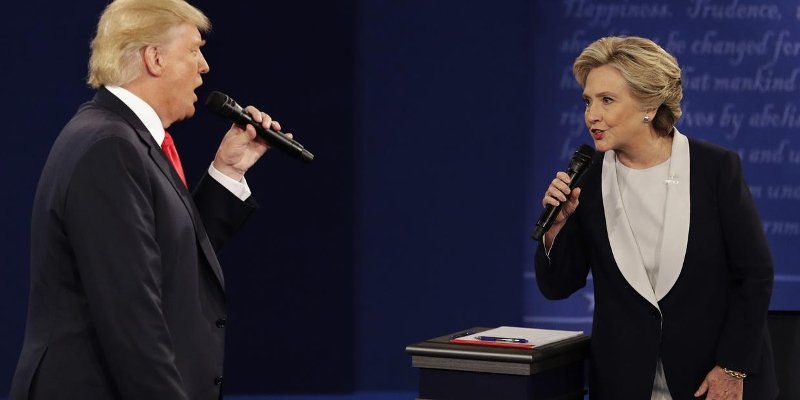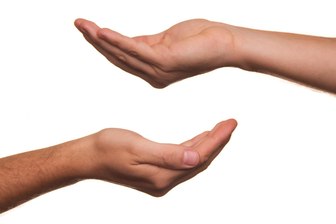Clinton has a 4% lead over Donald Trump heading into the last debate, while most Trump voters lack confidence in the integrity of vote counting
Heading into the third and final presidential debate, Democrat Hillary Clinton continues to hold a lead over Republican nominee Donald Trump, even while the GOP businessman’s supporters express serious concerns about the validity of the election, doubting the possibility that Clinton could legitimately win. In the latest Economist/YouGov Poll, Trump voters’ concerns extend beyond the vote count, affecting their opinions of several GOP party leaders. But Trump voters reject one accusation – they don’t think Russia is attempting to affect the outcome of this year’s election.
Clinton’s lead this week looks much like her lead in nearly every weekly Economist/YouGov Poll conducted in the last few months – there is a four-point difference among registered voters. That lead is stable whether third party candidates are included or not included in the question.
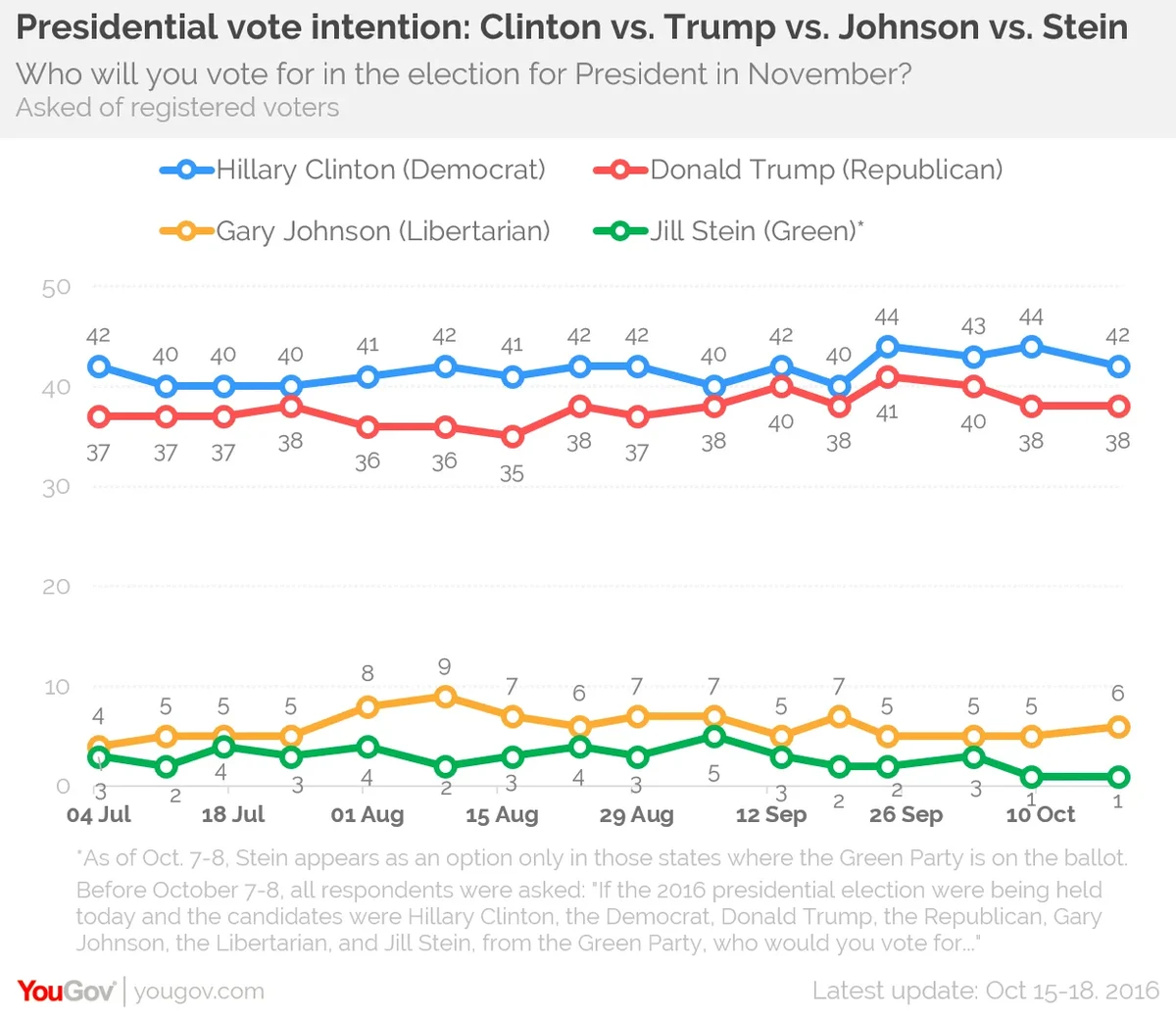
As usual, men are closely divided, while this week women give Clinton an eight-point lead. Trump runs belter with voters 45 and older than he does with younger voters. Women have been more likely than men to believe that the “Access Hollywood” tape of Trump discussing sexual conquests, released more than a week ago, is a serious matter, and they are also more likely to believe Trump’s statements on that tape were more than just “locker room talk.” 51% of women think Trump actually has done the actions he described on the tape. However, that percentage drops to 15% among Trump supporters – both male and female.
Trump has criticized what he sees as a “rigged election,” and has been doing so with increasing vehemence. In this, his voters are in agreement, though for many, it will be a “rigging” taking place somewhere other than their own neighborhoods. A majority of Trump supporters have little or no confidence that votes will be counted accurately across the country. That figures drops by half when the question is about accurate vote counting in their own communities, and by nearly half when it comes to the counting of their own ballot.
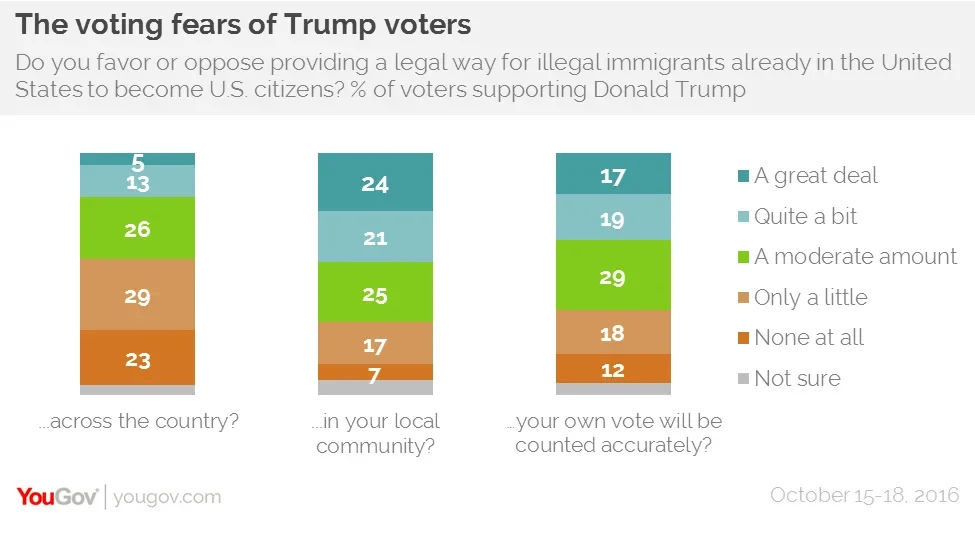
More than half of Trump’s supporters (57%) go so far as to say that if Hillary Clinton wins the election November 8, her election is very likely to be the result of voter fraud (a third of Clinton supporters would be very likely to attribute a Trump victory to fraud).
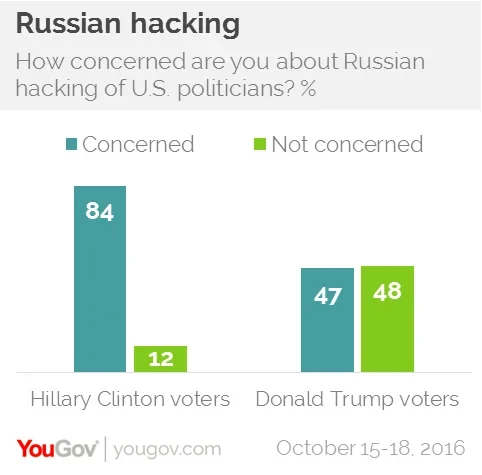
Clinton voters also worry about voting irregularities, but they are far more likely to care about eligible voters being kept from casting a ballot than they are to see a problem with people casting fraudulent votes. 57% of Clinton voters are very concerned about the impact of voter identification laws keeping legitimate voters from the ballot (compared with only 14% of Trump supporters). Clinton voters are also more concerned about the possibility that Russia might be interfering with American electoral process by hacking U.S. politicians. Half of Clinton voters are very concerned about that happening– four times as many as the number of Trump voters who say that.
Trump voters reject the government’s assertion that Russia was involved in the hack of Democratic National Committee and the ClInton campaign’s emails, one way Russia might be trying to influence the election. By 60% to 8%, Clinton supporters believe Russia was responsible. Only 10% of Trump voters agree.
Republican vice presidential nominee Mike Pence, along with many other GOP leaders, has taken issue with his running mate’s charges of likely voter fraud. Pence remains very popular with Trump voters (in fact, among all registered voters, Pence is more popular than Democratic vice presidential nominee Tim Kaine). But other members of the GOP don’t fare that well with Trump’s voters, most especially the GOP Congressional leadership.
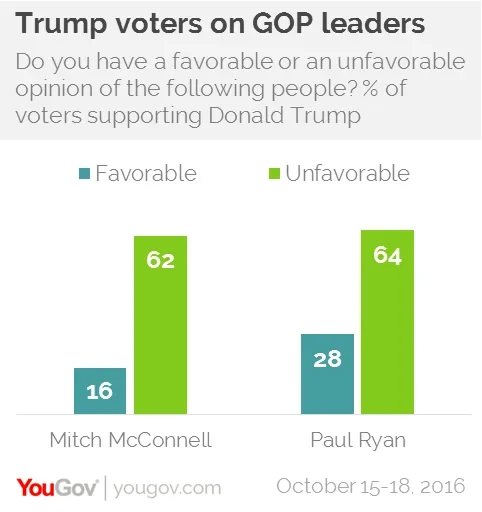
House Speaker Paul Ryan distanced himself from Trump after the “Access Hollywood” video was broadcast. Trump voters don’t approve. They think it was wrong for GOP leaders to withdraw their support. And they definitely don’t like Ryan (or his Senate counterpart, Mitch McConnell). Trump supporters are more than twice as likely to view Ryan unfavorably as favorably, and are even more negative e towards McConnell.
As was the case in Economist/YouGov polls conducted before the first two presidential debates, Clinton is viewed as the final debate’s likely winner, and by an even greater margin than she was before the other debates. Before Debate Two, 44% of registered voters believed Clinton would do better, and 30% said Trump would, a 14-point gap. Looking ahead to tonight’s final debate, the Clinton margin has grown to 19 points.
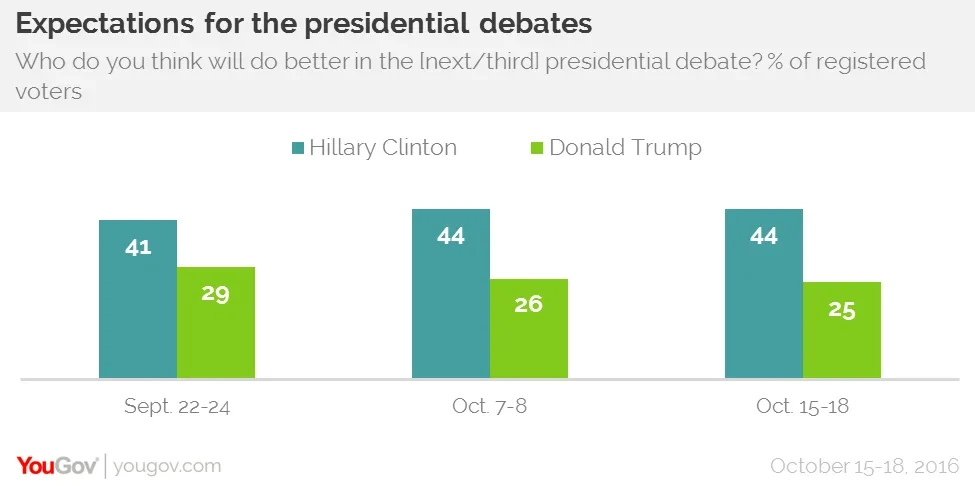
Clinton voters continue to hold higher expectations for Clinton’s debate performance than Trump voters give him: 86% of Clinton’s voters think she will outperform Trump at the debate; only 63% of Trump’s voters think he will do better than Clinton.
Perhaps the most popular element of the second debate was its format, with selected undecided voters asking the candidates questions. Nearly three-quarters of voter believe it was a good idea to use this format, and by two to one, those with an opinion said that the format made it a better debate, not a worse one. However, even more thought there was no difference.
See the rest of this week's YouGov/Economist Poll
YouGov/Economist Poll archives
